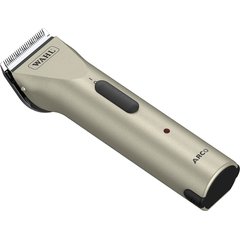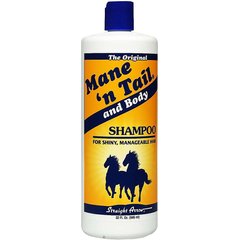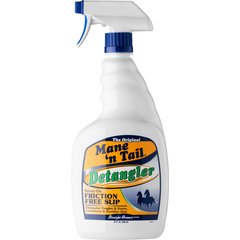Mustang Horse
WorldWideImages/E+ via Getty Images
The American Mustang is a feral horse that still thrives on public lands in the western United States. They are descendants of horses that Spanish explorers brought to this part of the world roughly 500 years ago.
But they aren’t just wild horses—you can find Mustangs bred in captivity or you can adopt one that was removed from the wild through the Bureau of Land Management (BLM), which manages the population of wild herds.
Before deciding to get a Mustang, though, there are several things to consider about their training needs, temperament, diet, and more.
Mustang Horse Snapshot
-
Height: 14–15 hands (56–60 inches)
-
Weight: 800 pounds
-
Lifespan: 36 years
-
Colors: All colors and patterns
Caring for a Mustang Horse
Mustangs can be difficult to train due to their wild history. But once they’re domesticated, they can make great companions. You can ride them for pleasure, use them for work, or compete with them in equestrian sports.
You can find Mustangs bred in captivity or you can adopt one that was removed from the wild through the Bureau of Land Management (BLM).
Mustang horses don’t have complicated grooming needs, but care should be taken to feed them properly to avoid unhealthy weight gain and give them balanced nutrition.
Mustang Horse Health Issues
Mustangs are strong and hardy horses, with few health concerns. However, they can inherit genetic disorders and develop other health problems, such as:
Polysaccharide Storage Myopathy (PSSM)
Glycogen is a type of sugar in the muscles. When a horse has polysaccharide storage myopathy (PSSM), an excessive amount of glycogen is made and stored in muscles. Polysaccharide storage myopathy type 1 is a hereditary muscular disorder that results in an abnormal accumulation and storage of glycogen (form of stored sugar in the body) in the muscle. These horses are unable to use the glycogen and this leads to breakdown of muscle.
There are two types of PSSM, and Mustangs can be genetically predisposed to type 1, which is caused by a mutation in the GYS1 gene. Type 2, on the other hand, is not associated with a genetic mutation.
When a horse with PSSM1 is physically active, their muscle cells can’t get the energy they need. Because of that, “tying-up,” or painful cramping of the muscles, occurs.
Many symptoms, particularly those affecting the muscles, can develop with PSSM1, including:
-
Cramps
-
Weakness
-
Stiffness
-
Soreness
-
Tremors
-
Sweating
-
Reluctance to move
-
Trouble standing or lying down
-
Poor performance
-
Muscles that feel firm or hard
-
Rolling
-
Pawing
Treatments for tying-up depend on its severity, and may include:
-
Stall rest
-
Intravenous fluids
-
Muscle relaxants
-
Diet changes
-
Nutritional supplements like vitamin E
A veterinarian can recommend the right treatment plan and provide guidance on reintroducing a horse to exercise.
Club Foot
Mustang horses may have musculoskeletal problems, including club foot. They can be born with this problem or develop it as they grow.
Club foot is a tendon flaw that typically affects the front legs. The deep digital flexor tendon (the tendon that goes along the back of the foot and attaches to the coffin bone) is shorter than it should be, and this causes the coffin bone (the bottommost bone that lies within the horse’s hoof) to rotate in the hoof. As a result, the hoof is too upright.
Treatment depends on whether a foal is born with club foot or develops it later, usually between 3 months and 3 years of age.
A veterinarian can recommend the best methods for relieving pain and relaxing and stretching the tendons. Trimming and shoeing the hooves can help correct this problem, but severe cases might need surgery.
Infections
Wild Mustangs commonly have heavy burdens of internal parasites since they are not being dewormed regularly like our domesticated horses. Also, when they are taken from the range to be domesticated, their odds of contracting bacterial and viral infections like strangles (equine distemper), equine rhinopneumonitis (rhino), or equine influenza (flu) increase due to lack of vaccinations and high density of horses in one area.
Internal parasites may cause symptoms like:
-
Lethargy
-
Potbelly appearance
-
Dull coat
Bacterial and viral infections may cause symptoms like:
-
Nasal discharge
-
Coughing
-
Fever
-
Swollen lymph nodes
A veterinarian can provide treatments for these conditions. Also, the Bureau of Land Management administers vaccinations at corral facilities to boost immunity and help keep Mustangs healthy.
What To Feed a Mustang Horse
It’s best to give your Mustang a diet that’s similar to what they would eat in the wild and to transition them slowly to any new foods. Mustangs are considered easy keepers, so they can gain weight easily. Ensure they eat a nutritious diet that isn’t too high in calories.
Just like domesticated horses, Mustangs should be feed primarily forage due to the normal function of their digestive tract. Feeding free-choice forage, such as grass hay and alfalfa hay, allows them to eat as they want.
Pasture grazing is also great for these horses. Most Mustangs have never had lush sugary feeds or pastures, so be cautious when introducing these food sources, especially grass.
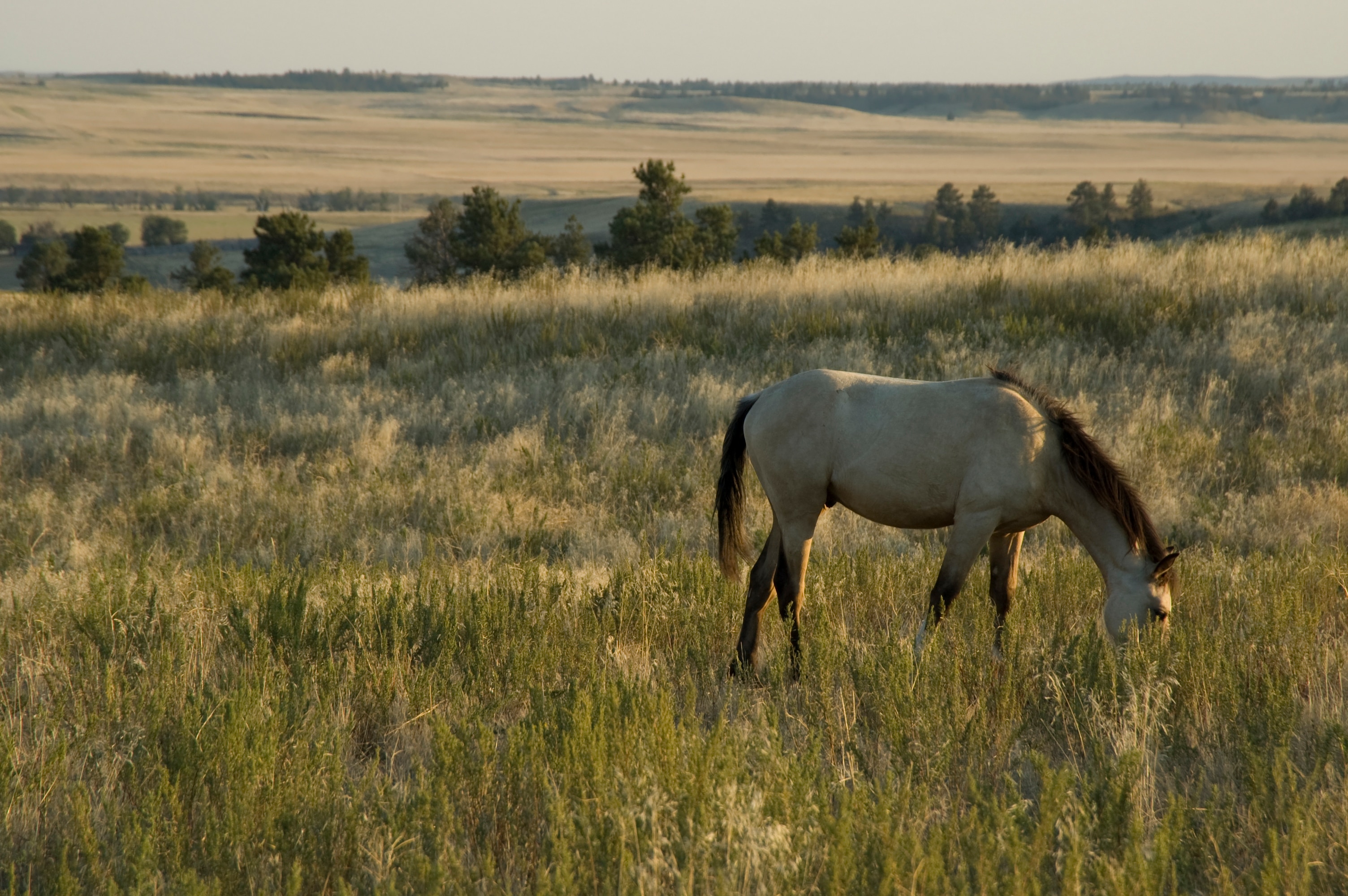
Because Mustangs are typically easy keepers, feeding forage and a low-calorie vitamin and mineral supplement may be ideal.
Generally, you can feed your horse 2% of their body weight in forage per day. For example, a Mustang weighing 820 pounds would need 16.4 pounds of forage daily.
It is always best to work with your veterinarian to develop the best nutrition plan for your mustangs needs.
Mustang Horse Disciplines
Mustangs are muscular horses that can move through different types of terrain with ease. They have the stamina and strength for long rides, and they’re fast—with the ability to gallop at 30 miles per hour.
Wild Mustang horses that are properly trained can do well in a variety of disciplines, such as:
-
Endurance riding
-
Barrel racing
-
Trail and pleasure riding
-
Ranch work
-
Reining
-
Dressage
Mustang Horse Personality and Temperament
Every horse is a unique individual with their own personality. That said, Mustangs are known for their intelligence and independence. They know how to survive on their own, but once they are trained and develop a bond with people, they’re willing to please and can learn quickly.
Because of their temperament, Mustang horses can be trained to work in a range of disciplines, and they’re also great riding companions. Whether you plan to use your horse to compete or simply to ride along beautiful trails, a Mustang may surprise you with what they can do.
Mustang Horse Training
As with a domesticated horse, Mustangs can also be stressed due to changes in their environment, so taking things slow and safe is always best.
If you aren’t an experienced horse trainer and keeper, a Mustang from the range won’t be right for you because they’re likely going to need an experienced horse handler to help them transition to a new environment. Instead, look for horses that have already received the proper training and are used to being around people.
On the other hand, if you have horse training expertise and experience, you can work with a Mustang that hasn’t had much human interaction. Training Mustang horses requires patience, understanding, and a gentle approach, but once they’re comfortable with you, they’re lovely companions.
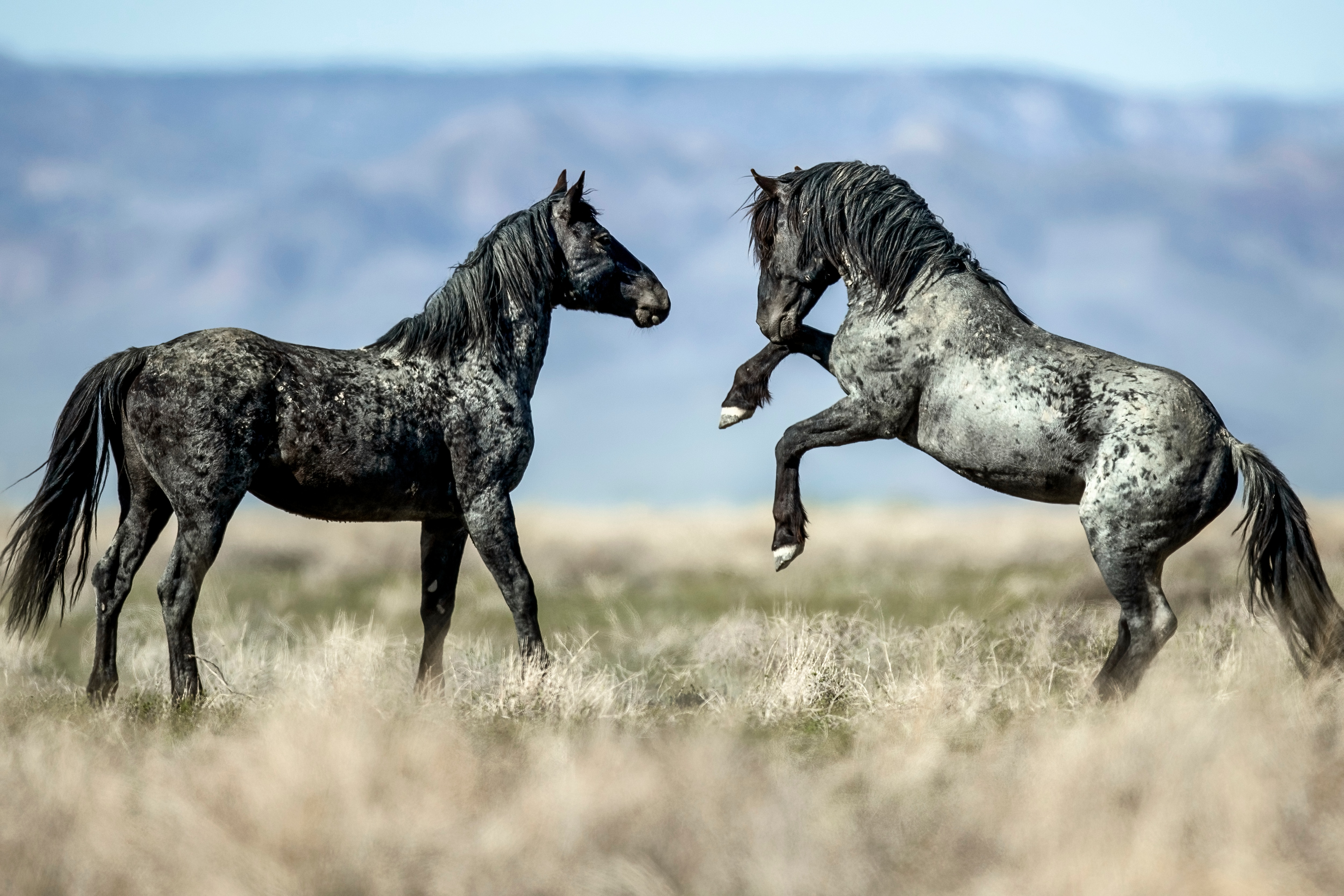
Older Mustang horses may be harder to train, so that’s something to bear in mind when you’re thinking about getting one. And to help reduce their stress, these horses might need to be housed separately from other horses until they get used to their new surroundings.
Mustang Horse Grooming Guide
The Mustang is not a complicated horse when it comes to grooming. A basic equine grooming routine will be enough to keep them looking healthy and clean.
Coat Care
Brushing your Mustang at least a few times a week will keep their coat smooth and shiny, and you can bathe your horse as needed. The right grooming products will make it easy to thoroughly clean their coat, as these items are designed to efficiently remove loose hair, dirt, and debris.
Because Mustang horses don’t have any specific requirements for coat care, you can use a standard grooming kit that includes tools like the following:
Recommended Products
Hoof Care
Domestic horses are born in an environment where they interact with people right away, so they’re accustomed to having their hooves handled and cleaned. But wild Mustangs need to be trained to be comfortable with this.
Once they’re OK with you lifting, examining, and cleaning their hooves, do so daily to look for signs of problems like infections and injuries. Use a high-quality hoof pick to clean your horse’s hooves of dirt, rocks, and other debris.
Hire a qualified farrier to trim and shoe your Mustang’s hooves on a regular basis. Your veterinarian can also check the hooves to be sure they’re healthy and strong.
Mustang Horse FAQs
What is so special about a Mustang horse?
The American Mustang horse has a rich history, surviving in the wild. Many people view them as a symbol of freedom, strength, and the beauty of the American West.
How much do Mustang horses cost?
You can adopt BLM Mustang Horses for a low price. Untrained horses can be adopted for as little as $25, but this is first-come, first-serve or through a lottery draw. If you want to competitively bid for a horse, you may end up paying a higher fee.
Trained or gentled Mustangs have a $125 minimum adoption fee, and you might spend more through competitive bidding. There’s also an Adoption Incentive Program offered by BLM, which gives up to $1,000 to those who wish to adopt a wild and untrained Mustang, and the fee is $125.
If you purchase a Mustang privately, you’ll likely pay hundreds or thousands of dollars. In addition to being trained, these horses might have strong bloodlines or experience in competitions and shows, making them more expensive.
How can you tell if a horse is a Mustang?
Mustangs have a few distinguishing features, including a muscular body and long legs. This horse has a long and crested neck and sloping shoulders. There are also many Mustang horse colors, including buckskin, white, and black.
Why are Mustang Horses called Mustangs?
The name Mustang is derived from the Mexican Spanish word mestengo, which means stray.
Are Mustang horses hard to ride?
Untamed Mustang horses are hard to ride. Those that are acquired from the wild will be more challenging to train compared to those born in captivity, due to their natural “flight or fight response” from growing up in the wild. Once they’re trained, they are generally easy to ride.


